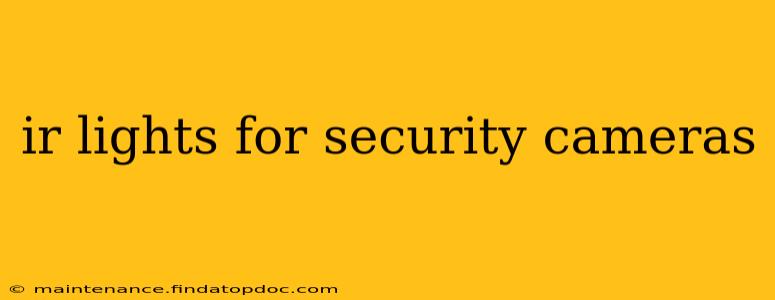Security cameras are essential for protecting homes and businesses, but their effectiveness diminishes significantly at night. This is where infrared (IR) lights become indispensable. IR lights, invisible to the human eye, allow security cameras to capture clear, detailed footage even in complete darkness. This article delves into the crucial role of IR lights in security camera systems, addressing common questions and providing insights for optimal performance.
What are IR Lights and How Do They Work?
Infrared (IR) lights emit invisible light waves that are beyond the visible spectrum perceived by humans. These lights illuminate the scene, and the camera's IR sensor detects the reflected IR light to create the image. Unlike visible light, IR light doesn't interfere with night vision and won't disturb people or animals in the area. The result is crisp, monochrome video footage, even in low-light or no-light conditions.
What is the Range of IR Lights on Security Cameras?
The range of IR lights varies greatly depending on the camera model and the power of the IR LEDs. Low-cost cameras might have a range of only a few meters, while high-end security cameras can illuminate areas up to 100 meters or more. The range is a critical factor to consider when choosing a security camera for a particular location. Consider the size of the area you need to monitor and select a camera with a sufficient IR range.
How to Choose the Right IR Lights for Your Security Camera System?
Choosing the right IR lights depends on several factors, including the camera's capabilities, the size of the area to be monitored, and the desired level of detail in the night vision footage. Here's a breakdown of key considerations:
- Camera Compatibility: Ensure the IR lights are compatible with your chosen camera model. Some cameras have integrated IR lights, while others require external IR illuminators.
- IR Range: Consider the distance you need to illuminate. Longer ranges are required for larger properties or areas with significant distances between the camera and the monitored area.
- IR LEDs: The number and type of IR LEDs significantly impact the illumination range and quality. More LEDs generally provide better illumination.
- Power Consumption: IR lights consume power; consider the camera's overall power requirements and its impact on your energy consumption.
- Environmental Factors: External factors like weather conditions (fog, rain, snow) can affect the performance of IR lights. Choose weather-resistant options for outdoor installations.
Are IR Lights Harmful to Humans or Animals?
No, IR lights are not harmful to humans or animals. The infrared radiation emitted is non-ionizing, meaning it lacks the energy to damage cells or DNA. Unlike visible light, it's invisible to the naked eye, so it won't disturb people or animals in the monitored area.
How Far Can IR Security Cameras See in Total Darkness?
The distance an IR security camera can "see" in total darkness is determined by the power of its IR illuminators and environmental factors. As mentioned above, ranges can vary from a few meters to over 100 meters. Factors like fog, heavy rain, or snow will significantly reduce the effective range.
How Do IR Lights Affect the Quality of Security Camera Footage?
High-quality IR lights enhance the quality of security camera footage by providing sufficient illumination for clear image capture in low-light conditions. However, poorly designed or insufficient IR illumination can lead to grainy, blurry, or distorted images. The number and intensity of the IR LEDs play a crucial role in ensuring optimal image quality.
What is the Difference Between IR and White Light Security Cameras?
IR cameras utilize infrared light for night vision, resulting in black and white footage. White light cameras use visible light, either from built-in or external lights, providing color footage at night. White light cameras might be preferred for situations where color identification is crucial, while IR cameras offer superior performance in complete darkness due to their longer range.
By understanding the capabilities and limitations of IR lights, you can make informed decisions when selecting a security camera system that meets your specific needs and provides reliable surveillance, day and night. Remember to always prioritize quality components and professional installation for optimal performance and longevity.
